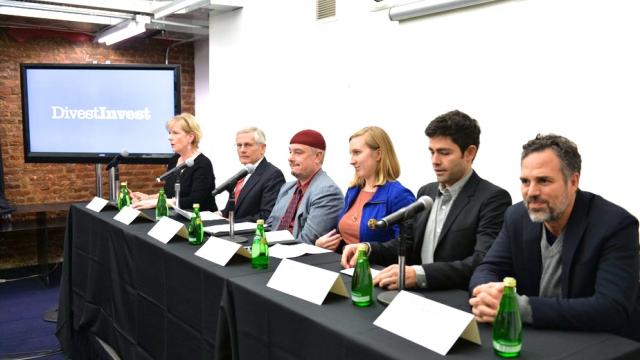
Nearly 690 institutions and 58,400 individuals representing at least $5 trillion in assets have now committed to purging their investments from fossil fuel companies, a new report said.
That represents about a 50-fold increase in assets tied to groups and people involved in divestment since the last assessment was published in September 2015. The latest analysis was published Monday by Arabella Advisors, a Washington, D.C.-based consultant to philanthropies. The total assets that have already been divested is not known.
The U.S.-based Amalgamated Bank, the Islamic Society of North America, and dozens of cities, including Washington, D.C., Sydney and Berlin are among the entities that have vowed to divest at least partially from coal, oil and natural gas companies in the last 15 months.
"This movement began with a moral call to action: If you owned fossil fuels, you owned climate change," Ellen Dorsey, executive director of the Wallace Global Fund, said at a press conference Monday in New York. Wallace Global Fund announced plans to divest in 2014, making it one of the first philanthropies to do so.
In what Dorsey called the second wave of divestment action, "financial self-interest bolstered the ethical case." She added: "Today, a third wave is rising. Based on legal analyses, there may be an active fiduciary duty to move out of fossil fuels given the Paris agreement and new disclosures about climate risk." (The Task Force on Climate-related Financial Disclosures, which launched a year ago at the climate negotiations in Paris, will release its recommendations for ways businesses should disclose climate risks this week.)
As the divestment movement has grown, it has expanded in geographical reach—coming from people and groups spanning 76 countries—and in types of organizations divesting.
Philanthropic foundations and faith-based organizations represent the largest proportion of the groups, at 23 percent. That is followed by local governments at 17 percent, educational institutions at 14 percent, pension funds at 12 percent, nongovernmental organizations at 6 percent, for-profit asset management at 3 percent and health care organizations at 2 percent.
The incoming Donald Trump administration, however, threatens to slow the divestment tide. Trump has pledged to roll back domestic climate policies and encourage fossil fuel development in the United States. If this leads to oil, gas and coal companies growing and profiting in the next few years, groups considering divestment based solely on the performance of their fossil fuel stocks may reconsider.
Activists recognize the challenges a Trump presidency poses to their climate campaigns, including on divestment. "We anticipate this regressive administration undoing much of the progress we've made," May Boeve, executive director of the green group 350.org, said. "But it makes one thing clear: It's more crucial than ever for our institutions to divest."
The divestment movement started at a handful of Northeast college campuses in 2012 and 2013. The region continues to see divestment action. In May, the University of Massachusetts announced its plans to divest all direct fossil fuel holdings; in September, Boston College said it would avoid investments in coal and tar sands. (Meanwhile, student-backed campaigns at Swarthmore, the Massachusetts Institute of Technology and Stanford have yet to sway administrators to divest.)
Many of the recent pledges from academic institutions have come outside the United States. For example, more than a quarter of British universities have announced plans to divest, including the University of Kent and Manchester Metropolitan University.
Faith-based organizations, another group that joined the divestment movement early, continue to expand their efforts. At the global climate talks in Marrakech in November, the Islamic Society of North America became the first Muslim institution to publicly join the movement.
Museums have joined the trend as well. The American Museum of Natural History, which has been targeted by anti-fossil fuel campaigners, no longer has direct investments in fossil fuel companies, activists announced on Monday.
Currently, less than 2 percent of the museum's investments are in fossil fuels. "The small percentage we have is in indirect investments and our managers have an on-going request to be mindful of this issue, which we began working on in 2014," Anne Canty, a spokeswoman for the museum, wrote in an email to InsideClimate News.
Another shift is that more groups looking to divest from fossil fuels are increasingly investing in clean energy and climate solutions. This is particularly true for banks, pension funds and insurers. In May 2016, the $791 billion insurance company Aegon said it planned to divest from coal and emphasize investments in more sustainable forms of energy.
Change comes "when people think it's in their own interest to do something and to do something different from what they've been doing before," said Helena Morrissey, former chief executive of London-based Newton Investment Management. "I believe now we are closing in on that moment in the investment community."
3 WAYS TO SHOW YOUR SUPPORT
- Log in to post comments















